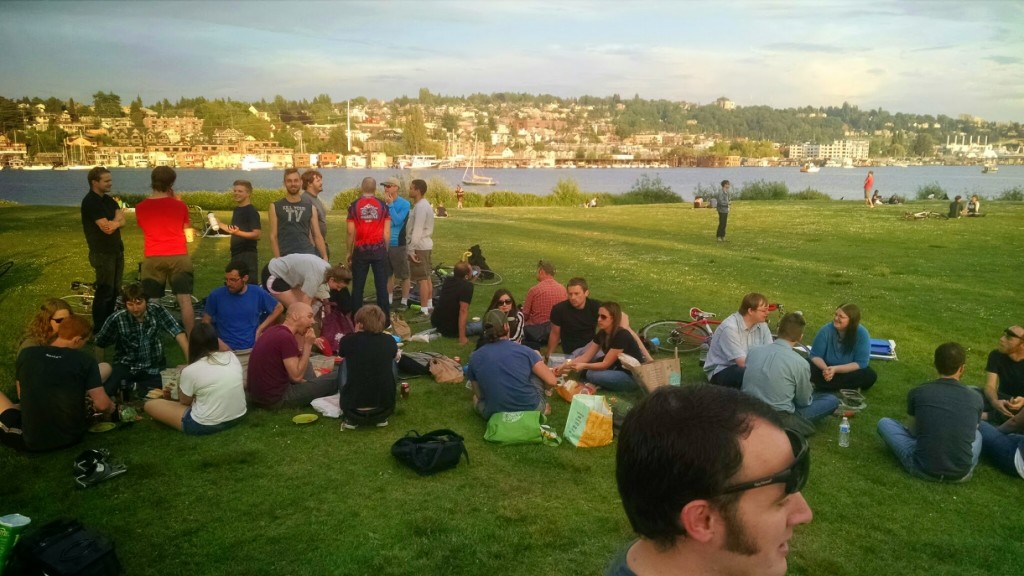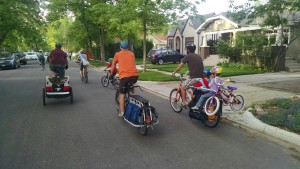Get Rich With: Your Own Urban Tribe

A small tribe of Mustachians gathers in a Seattle Park earlier this summer
Here in the MMM family household, we live a lifestyle that could be considered unrecognizably oddball, or classically familiar depending on who you ask. Although the fairly well-appointed house in an expensive area probably does a good job at reassuring certain neighbors that we fit in, our lives are pretty different.
We spend most of our time within a 2-mile circle with home at the center. The car is just starting in on its third tank of gas for the year, and I'm expecting this one to make it through December. We often go months without visiting any store besides the grocery, and the half million dollar house contains no TV set, clothes dryer, powered lawnmower, ties or suit jackets of any sort, and no items of clothing (other than great hiking shoes) worth more than about $50.
None of this is by necessity or due to lack of money, it's just how we've ended up after ten years of freedom from conventional work, while trying to optimize our lives for happiness rather than maximum consumption. But the end result is still pretty powerful, as I can't seem to blow more than about $25,000 per year no matter how luxurious we feel our lives are.
The further along we go, the more I realize this is a great way to live, and probably not just for us. Because a life like this comes with other changes aside from the superficial spending-related ones described above. It seems that we are sliding right into the comfortable groove of much older human civilizations, the ones in which all of our instincts are more at home: something you could call the tribe.
The Modern Urban Tribe
I've noticed that our life is following a pattern that echoes back to a far distant era. We wake up when our bodies feel they have had enough sleep and the house is brightening with the sky. I walk outside to inspect the sunrise with bare feet and strong coffee, and a relaxed breakfast for all of us is never compromised. Only after this routine, sometimes with music or other times with a chapter of reading from a book, do we start to think about other things like meetings or appointments or heading out for some good old-fashioned hard work.
Our house backs onto a park, which is at the center of a human-friendly community where people actually walk places. Because of this, people tend to just show up throughout the day. Little MM might run out to join some friends after seeing them out throwing toy airplanes in the park, who later join him to make mud rivers in the back yard or come inside for a round of Starcraft II. Kids wander in pairs or groups from one household to another without an armored SUV escort, or even shirts or shoes. We all climb trees and play in the creek. Adult friends might stop in as part of an afternoon walk, which ends up leading to beers and the joint cooking of a feast, which in turn attracts other adults and children, possibly even leading to unexpected tent sleepovers in the back yard.
In such a community, leisure and work tend to blur together. I might recruit a friend to help build a fence, who ends up needing my help to replace a furnace. A third friend might stop by to learn about the installation process, but mention a house he saw for sale down the street which leads to a short-term real estate investment partnership. Everybody could use some help at times, and everyone has some help to offer at other times. As a result, kids and salads, tools and books and loaned vehicles, money and heirloom tomatoes and homebrews tend to circulate freely through the crowd, enriching us all with each transaction.
Such a life is not just the quaint habit of a few lucky rich people in a friendly, safe neighborhood. It is the foundation of human civilization itself. We are meant to live in medium-sized groups, to walk between each other's dwellings, and to collaborate and play freely with an abundance of unscheduled free time. When you start with these basic building blocks of a community, you automatically press your happiness buttons and suddenly start living a much happier, healthier life.
Lessons in Tribalism from my Summer Vacation
This summer, I had an unusually action-packed trip as I made my way through the cities of Hamilton, Toronto, Ottawa and surrounding spots in Canada to visit friends and family. With our own lifestyle so bright in my mind, it was fascinating to see how other people live.
Many people we know in Ottawa live in isolated suburbs, scattered 30 miles from their other friends and from work. Some chose their location because they wanted to live on a large plot of land, and others because they wanted a big house that still fit within the limits of their mortgage payment budget. But few if any made the choice based on living within walking distance of friends, family, food and work.
They have adapted to this situation by living more planned lives. A long email discussion of schedules precedes any gathering of friends, and they need to work around traffic and weather and repairs and gas prices. Brand new cars have gone from shiny to dull to rusty to junkyard while my used car has yet to lose the stiff blackness of its nearly new seat fabric. Getting together is still fun, but it tends to happen less often and end earlier in the night. I couldn't help but notice the amount of happiness this physical distance seems to subtract from the equation.
Later I ended up in San Francisco, peeking in on the lives of some new friends as an outsider. As I joined the neighborhood parties and looked at the way this much smaller, bike-scaled city functions, I noticed that the social life of these friends was much more similar to my own despite the much larger population of the city. Spontaneous gatherings and sharing of household amenities was the norm. Patios or parks would fill with neighbors and driveways would fill with bikes. The fact that people lived within walking or biking distance of friends seemed to make all the difference.
The final lesson came when I headed to Victoria, BC for three days. This is an island city of 80,000 people which happens to feature the highest rate of bicycle commuting in Canada. Meeting a friend at a the airport, we immediately went to one neighbor's house to borrow a bike for the duration of my visit and ditched the motor vehicle. Then we rode to a barbecue gathering for local business owners. The next day featured a longer ride through the city and out to the surrounding lakes and mountains, then I took a bus downtown to join a meetup of Mustachians in a public park. Afterwards we walked out for a late night dinner, and then I enjoyed an hour-long solo midnight walk back through the city to my temporary home.
I found an amazing similarity to my own city of Longmont, Colorado. More seemingly random people knew and cared about each other, spontaneous gatherings and excursions to the mountains were commonplace, and the general consensus was that this was a wonderful and happy place to live. Prosperity and good health seemed to be in abundant supply in these more tribe-oriented places.
So How Can this Make us All Richer?
I believe the close and local community is a big part of what we've been losing with modern life. The dual-full-time-income-plus-kids household, ivy-league preschool syndrome, car commuting and suburban sprawl in our city designs have all made it a little harder to live a local lifestyle. But it absolutely does not have to be that way.
There's a Greek island called Ikaria that pops up regularly in health news because its people enjoy some of the longest, healthiest lives on Earth. At least once a month, somebody emails me a link to one of a few major stories about it, because they notice the parallels to the lifestyle you and I are working towards right here. Plenty of sleep. Some outdoor hard work every day. A high degree of socialization. And of course, olive oil and wine as desired. Ikaria is the Original Island of the Mustachians. Even without much money, these people are wealthier than most of us in rich cities.
Slowly but surely, the US is waking up from its suburban slumber and starting to change the way cities are designed, with groups like Strong Towns pushing and city planners trained in New Urbanism pulling as they gradually start displacing the people who were raised with nothing but cars. But without even waiting for these changes, we can start adding some Ikaria to our own lives.
Great Friends are Hiding Among your Neighbors

Some of my own tribe travels the streets of Longmont, CO
You just need to start meeting your neighbors. Not just one or two of them, but all of them. Not everybody will be cool or fun or have much in common with you, but some of them actually will. When I move to a new house, I actually write down the addresses of the 10 nearest houses and then set a goal of filling in a name and summary of the details for each household. Then I keep branching out and making eye contact and meeting people from other nearby blocks, because it is a genuinely happy thing to know people who live so close to you. Why focus your energy on traveling to meet friends who live several cities away, while ignoring those right next door who you haven't even met yet?
Joining local groups can facilitate this, whether it's through a school, business group, church, or bike, sport or volunteer club. Even getting a part-time job at an in-style downtown venue works well. The key to keeping it tribal is simply to keep it local - you need to mingle with people you actually live with. To create an area with a "high social collision rate" as a doctor friend of mine puts it.
Even after 10 years in my own city, I still run into a new person every week who I'd actually like to spend time with, who lives within a five minute walk. As the network grows, so does my happiness. And miraculously, the number of things I can think of to spend money on continues to drop, because a more satisfying life automatically cuts down your desire to doll it up with more toys.
The answer to a better life may be walking past you right now.
Further Reading:
This year a busy urban neighborhood in South Korea tried banning cars for an entire month. It ended up blowing everyone's minds for the better: http://www.fastcoexist.com/3045836/heres-what-happened-when-a-neighborhood-decided-to-ban-cars-for-a-month
Do any Longmontians want to try this here? The first city in the US to accomplish this feat will start a chain reaction that changes everything.